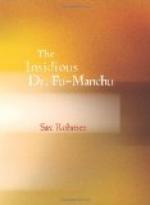From the rescue of Lord Southery my story bears me mercilessly on to other things. I may not tarry, as more leisurely penmen, to round my incidents; they were not of my choosing. I may not pause to make you better acquainted with the figure of my drama; its scheme is none of mine. Often enough, in those days, I found a fitness in the lines of Omar:
We are no other than a moving
show
Of Magic Shadow-shapes that
come and go
Round with the Sun-illumined
Lantern held
In Midnight by the Master
of the Show.
But “the Master of the Show,” in this case, was Dr. Fu-Manchu!
I have been asked many times since the days with which these records deal: Who was Dr. Fu-Manchu? Let me confess here that my final answer must be postponed. I can only indicate, at this place, the trend of my reasoning, and leave my reader to form whatever conclusion he pleases.
What group can we isolate and label as responsible for the overthrow of the Manchus? The casual student of modern Chinese history will reply: “Young China.” This is unsatisfactory. What do we mean by Young China? In my own hearing Fu-Manchu had disclaimed, with scorn, association with the whole of that movement; and assuming that the name were not an assumed one, he clearly can have been no anti-Manchu, no Republican.
The Chinese Republican is of the mandarin class, but of a new generation which veneers its Confucianism with Western polish. These youthful and unbalanced reformers, in conjunction with older but no less ill-balanced provincial politicians, may be said to represent Young China. Amid such turmoils as this we invariably look for, and invariably find, a Third Party. In my opinion, Dr. Fu-Manchu was one of the leaders of such a party.
Another question often put to me was: Where did the Doctor hide during the time that he pursued his operations in London? This is more susceptible of explanation. For a time Nayland Smith supposed, as I did myself, that the opium den adjacent to the old Ratcliff Highway was the Chinaman’s base of operations; later we came to believe that the mansion near Windsor was his hiding-place, and later still, the hulk lying off the downstream flats. But I think I can state with confidence that the spot which he had chosen for his home was neither of these, but the East End riverside building which I was the first to enter. Of this I am all but sure; for the reason that it not only was the home of Fu-Manchu, of Karamaneh, and of her brother, Aziz, but the home of something else— of something which I shall speak of later.
The dreadful tragedy (or series of tragedies) which attended the raid upon the place will always mark in my memory the supreme horror of a horrible case. Let me endeavor to explain what occurred.
By the aid of Karamaneh, you have seen how we had located the whilom warehouse, which, from the exterior, was so drab and dreary, but which within was a place of wondrous luxury. At the moment selected by our beautiful accomplice, Inspector Weymouth and a body of detectives entirely surrounded it; a river police launch lay off the wharf which opened from it on the river-side; and this upon a singularly black night, than which a better could not have been chosen.




